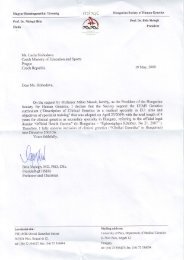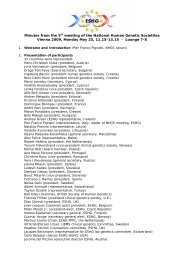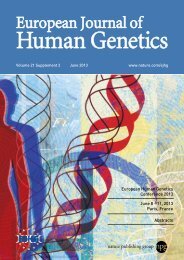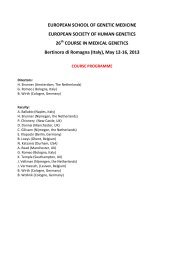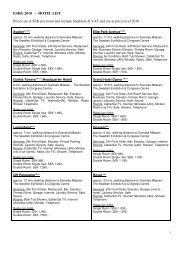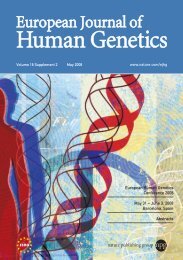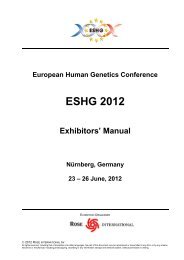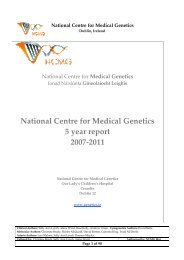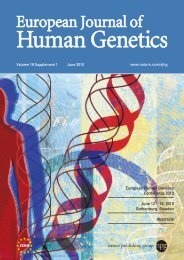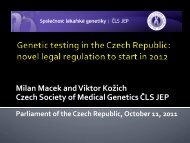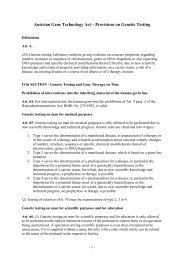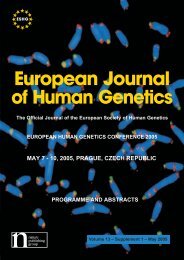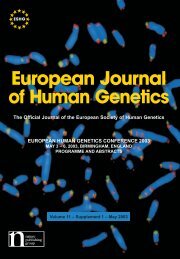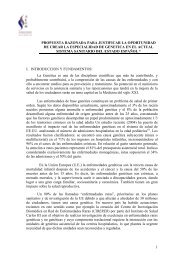2009 Vienna - European Society of Human Genetics
2009 Vienna - European Society of Human Genetics
2009 Vienna - European Society of Human Genetics
You also want an ePaper? Increase the reach of your titles
YUMPU automatically turns print PDFs into web optimized ePapers that Google loves.
Genetic counseling <strong>Genetics</strong> education, Genetic services, and Public policy<br />
More than three fourths and more than half <strong>of</strong> patients, respectively,<br />
were diagnosed based on results <strong>of</strong> genetic testing and family history.<br />
At the time <strong>of</strong> diagnosis, with surprise and uneasiness, many respondents<br />
concerned “inheritance <strong>of</strong> the disease to their children” as well<br />
as their own “future symptoms” and “future treatment”. As time passes<br />
after the diagnosis, majority <strong>of</strong> patients reported a relief <strong>of</strong> anxiety, but<br />
some reported further increase <strong>of</strong> their anxiety, probably related to aggravation<br />
<strong>of</strong> the diseases and concern about genetic testing for their<br />
children. At the time <strong>of</strong> diagnosis, medical information was on the top<br />
<strong>of</strong> the list they wanted, but as time passed, they asked more social-<br />
and physical support.<br />
In addition to an appropriate medical management, sustained assistance<br />
which meets variety <strong>of</strong> needs <strong>of</strong> patients and the families is necessary<br />
to provide better quality <strong>of</strong> life to them, and establishment <strong>of</strong> an<br />
appropriate administration system is desired for that purpose.<br />
P01.36<br />
molecular and cytogenetic laboratory <strong>of</strong> Leningrad province:<br />
2008<br />
I. A. Ivanov1 , M. O. Mkheidze2 ;<br />
1 2 District Children Hospital, St.Petersburg, Russian Federation, Medical Academy<br />
for postgraduate studies, St.Petersburg, Russian Federation.<br />
Molecular and cytogenetic laboratory is stationed at District Children<br />
Hospital. Last year it realized neonatal screening for PKU, CH, CF,<br />
galactosemia, cytogenetic investigations for making diagnosis <strong>of</strong> chromosomal<br />
pathology, prenatal screening for congenital defects (doubletest),<br />
confirmation <strong>of</strong> hereditary diagnosis, medical care, long term inpatient<br />
and outpatient care, dietary management, genetic counseling.<br />
10951 <strong>of</strong> newborns were examined through neonatal screening. Four<br />
children with PKU, two cases <strong>of</strong> CH, one case <strong>of</strong> galactosemia and<br />
one case <strong>of</strong> CF were diagnosed. Cohort <strong>of</strong> children with PKU, CH, CF<br />
and galactosemia has special dietary and medicinal treatment. Prenatal<br />
biochemical screening <strong>of</strong> the first ( PAPP-A, HCGb) and the second<br />
(alfa-FP, HCG) trimesters was performed for pregnant women (5962).<br />
Owing to realization invasive prenatal investigation (369) we were able<br />
to detect prenatally trisomy 21 (3 cases), Turner syndrome (2 cases),<br />
syndrome <strong>of</strong> partial deletion <strong>of</strong> chromosome 18 (1 case). We have detected<br />
some new cases <strong>of</strong> chromosomal pathology postnatally (in total<br />
969 samples): trisomy 21 (22 cases), trisomy 18 (2 cases); syndrome<br />
<strong>of</strong> partial deletion <strong>of</strong> chromosome 5 (1 case), and some other cases<br />
with chromosome pathology. Five children with CF were found using<br />
sweet test for 260 samples. We continue to create register <strong>of</strong> inherited<br />
and congenital disorders among Leningrad province population.<br />
P01.37<br />
First experiences with the extended newborn screening program<br />
in the Netherlands<br />
M. C. Cornel1,2 ;<br />
1 2 VU University Medical Center, Amsterdam, The Netherlands, Centre for <strong>Society</strong><br />
and Genomics, Nijmegen, The Netherlands.<br />
By January 1st , 2007 the newborn screening program in the Netherlands<br />
was extended from three disorders to 17, including mediumchain<br />
acyl-CoA dehydrogenase deficiency and sickle-cell disease. The<br />
selection <strong>of</strong> disorders to be screened for was based on a report <strong>of</strong> the<br />
Dutch Health Council. Three categories were distinguished: disorders<br />
for which considerable irreparable damage can be prevented (category<br />
1), disorders for which this applies to a lesser degree or for which<br />
the evidence is inconclusive (category 2), and disorders for which newborn<br />
screening does not prevent damage to health (category 3).<br />
In 2007 a total <strong>of</strong> 194 infants were diagnosed in the neonatal screening<br />
program, including 60 with sickle-cell disease or a serious hemoglobinopathy,<br />
70 with a metabolic disorder, 57 with congenital hypothyroidism<br />
and 7 with congenital adrenal hyperplasia. The uptake remained<br />
stable at 99.75%. Information in the third trimester <strong>of</strong> pregnancy was<br />
given to enable parents to make an informed decision on participation<br />
to the newborn screening and to decide on unintentionally found carrier<br />
information. The decision to participate to the newborn screening<br />
was an informed decision in 80% <strong>of</strong> cases. The decision (not) to opt<br />
out to receive information on carrier status was an informed decision in<br />
60% <strong>of</strong> cases. The attitude to the newborn screening program is very<br />
positive, but information can be improved. Carrier status was <strong>of</strong>ten<br />
communicated without stressing the consequences <strong>of</strong> this information<br />
for reproductive choices <strong>of</strong> the parents. The next disease to be in-<br />
cluded might be cystic fibrosis.<br />
P01.38<br />
Genetic counseling <strong>of</strong> phenylketonuria (PKU) patient’s parents<br />
V. L. Izhevskaya1 , L. Y. Ivanova2 , I. V. Zhuravleva2 , E. K. Ginter1 ;<br />
1 2 Research centre for medical genetics, Moscow, Russian Federation, Institute<br />
<strong>of</strong> sociology, Moscow, Russian Federation.<br />
The PKU patient’s parents appraisal <strong>of</strong> different aspects <strong>of</strong> genetic services<br />
in Russia in connection with neonatal screening was estimated.<br />
261 respondents from 5 regions <strong>of</strong> Russia were participated in the<br />
research. Only 13.4% <strong>of</strong> respondents knew about the program <strong>of</strong> neonatal<br />
screening for PKU in Russia before the birth <strong>of</strong> the PKU child<br />
while over 85 % <strong>of</strong> them knew nothing about it. Many respondents<br />
specified the absence <strong>of</strong> the adequate information about screening<br />
for hereditary diseases in their comments to the questionnaire. Almost<br />
all respondents (97%) have received information about the hereditary<br />
character <strong>of</strong> their child disease from the genetic counselors, and 95.8<br />
% <strong>of</strong> them have specified that they have understood this information.<br />
However only 62.9% <strong>of</strong> respondents could correctly specify the value<br />
<strong>of</strong> recurrence risk <strong>of</strong> PKU, and only 36.4 % <strong>of</strong> them could correctly attribute<br />
a risk category. From our point <strong>of</strong> view the absence <strong>of</strong> adequate<br />
information about neonatal screening as well as simultaneous providing<br />
information on hereditary character, recurrence risk and prenatal<br />
diagnostics <strong>of</strong> the PKU make genetic counseling <strong>of</strong> such families noneffective.<br />
Changes in methodology <strong>of</strong> genetic counseling <strong>of</strong> PKU families<br />
should be introduce in Russia. Prenatal diagnostics <strong>of</strong> PKU was<br />
acceptable for approximately to 40% <strong>of</strong> respondents, and the abortion<br />
<strong>of</strong> a PKU foetus is morally acceptable to about two-thirds <strong>of</strong> them.<br />
P01.39<br />
correlation <strong>of</strong> clinic, genetic and epigenetic aspects implicated<br />
in the etiology <strong>of</strong> Prader Willi/Angelman syndromes: model <strong>of</strong><br />
multidisciplinary approach for rare diseases in Romania<br />
M. Puiu1 , G. Anton2 , D. Dan3 , C. Popoiu1 , C. Rusu4 , V. Pop5 , C. Badiu6 , M.<br />
Stoian1 , N. Cucu7 ;<br />
1 2 University <strong>of</strong> Medicine &Pharmacy, Timisoara, Romania, National Institute<br />
<strong>of</strong> Virusology, Bucharest, Romania, 3Romanian National Alliance <strong>of</strong> Rare Diseases,<br />
Zalau, Romania, 4University <strong>of</strong> Medicine &Pharmacy, Iasi, Romania,<br />
5 6 University <strong>of</strong> Medicine &Pharmacy, Cluj-Napoca, Romania, National Institute<br />
<strong>of</strong> Endocrinology, Bucharest, Romania, 7University <strong>of</strong> Bucharest, Romania.<br />
The purpose <strong>of</strong> this research is to establish the new hypotheses that<br />
are responsible for Prader- Willi/Angelman syndromes. Our study has<br />
as objectives the implementation <strong>of</strong> new molecular methods for genetic/epigenetic<br />
investigation and establishment <strong>of</strong> national centers<br />
with high expertise in approaching the two syndromes, the rare genetic<br />
diseases that will develop educational reference and release centers.<br />
We also aim to evolve efficient partnership with patients associations<br />
through specific modalities like dialogue. The power <strong>of</strong> these associations<br />
will propel the research, will inform the patients and will respond<br />
to civil society questions. The study will establish international collaboration<br />
and partnerships with researchers having similar scientific interest,<br />
establish partnerships with PWS-Organizations, IPSWO, research<br />
groups from each country aiming financial support on programs that<br />
intend to stimulate collaboration between specialists, researchers and<br />
nongovernmental organizations. Finally, we aim to develop a multidisciplinary<br />
partnership, to build a common platform <strong>of</strong> activities for<br />
new innovative solutions in respect to rare disease needs. These new<br />
bridges <strong>of</strong> real and effective collaboration will ascertain on the national<br />
level the setting up <strong>of</strong> a solid network comprising institutions with high<br />
expertise in this domain, well connected to other national or international<br />
research networks. The results <strong>of</strong> the research will be published<br />
in well-known journals with high impact factors for enlargement <strong>of</strong> Romanian<br />
research visibility in international domain <strong>of</strong> rare diseases. In<br />
conclusion our project aims to implement in Romania the <strong>European</strong><br />
model <strong>of</strong> the network for rare diseases research, model adapted with<br />
success in management <strong>of</strong> these diseases.



